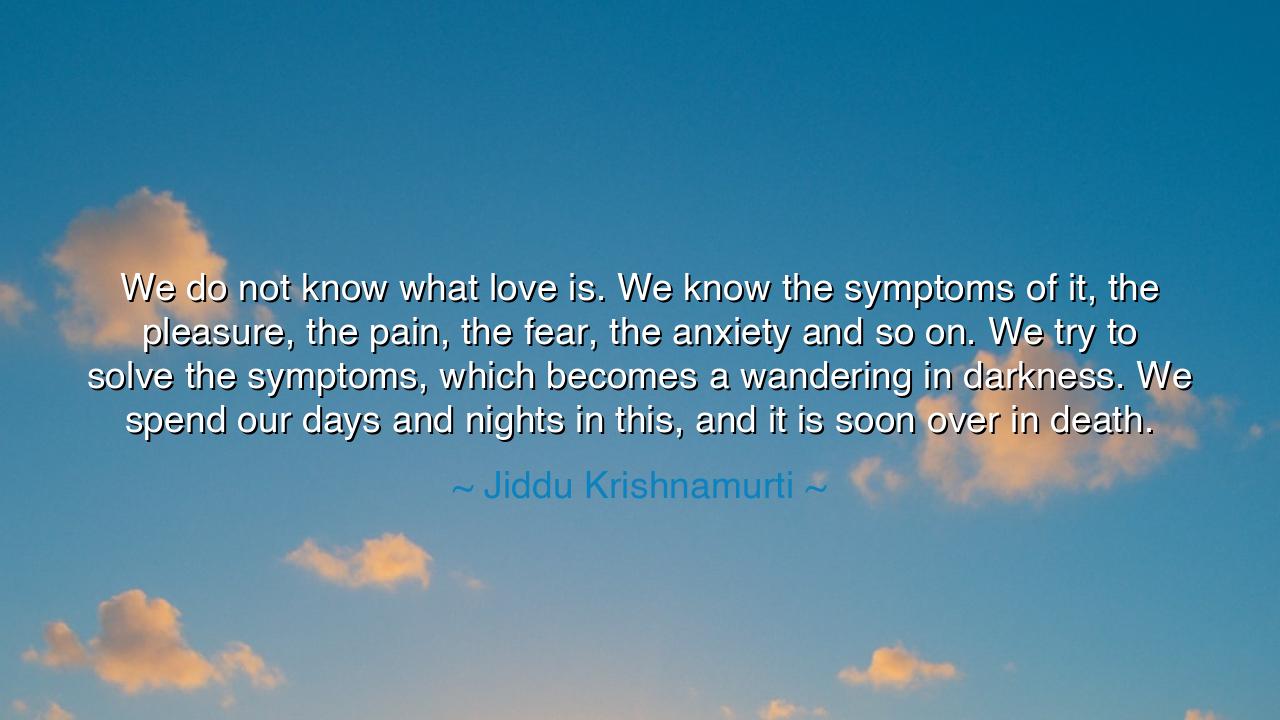
We do not know what love is. We know the symptoms of it, the
We do not know what love is. We know the symptoms of it, the pleasure, the pain, the fear, the anxiety and so on. We try to solve the symptoms, which becomes a wandering in darkness. We spend our days and nights in this, and it is soon over in death.






The words of Jiddu Krishnamurti — “We do not know what love is. We know the symptoms of it, the pleasure, the pain, the fear, the anxiety and so on. We try to solve the symptoms, which becomes a wandering in darkness. We spend our days and nights in this, and it is soon over in death.” — pierce through the illusions of human emotion like a blade cutting fog. Here speaks not a poet of romance, but a sage who has seen through the shimmering veil of sentiment and sought the unadorned truth. Krishnamurti, ever the challenger of dogma and comfort, reminds us that what we call love is often only the echo of our own desires and fears — the symptoms of attachment, dependency, and longing. He warns that to chase these shadows is to live in darkness, mistaking the reflections on the wall for the flame itself.
In his teachings, Krishnamurti often dismantled the ideas by which humanity tries to define and possess love. He saw that people cling to love as to a treasure, yet their grasp tightens into control, jealousy, and fear of loss. The very word becomes burdened with expectation. “We do not know what love is,” he says, because we have imprisoned it within the walls of the self. We recognize its effects — the trembling joy, the aching sorrow, the hunger for connection — and we call these sensations love. But love, in its truest form, is beyond the reach of thought. It cannot be contained by reason, nor corrupted by desire. What we call love is often only the restless movement of the mind seeking fulfillment, and thus, as Krishnamurti warns, we wander endlessly through pleasure and pain, mistaking their alternation for the truth of the heart.
In his time, Krishnamurti traveled across the world, teaching that freedom — spiritual and emotional — begins when we observe ourselves without judgment. He taught that love cannot be cultivated or commanded, for it is not a product of the mind but the flower of awareness. It blooms only when the soil of fear, possessiveness, and expectation has been cleared. The symptoms of love — the excitement, the fear, the dependency — are the smoke, not the flame. And yet, humanity, trapped in its restlessness, keeps tending to the smoke, fanning it, worshiping it, believing it to be the fire. Thus we live our lives in circles, tending illusions until the end, never touching the essence of the thing itself.
Consider, my children, the tale of Cleopatra and Antony, whose passion burned brighter than empires but consumed them both. History remembers their love as grand and tragic, yet Krishnamurti might say that what they shared was not love, but attachment clothed in glory — the hunger of two souls seeking fulfillment in each other and finding only destruction. The same pattern repeats through the centuries: kings, poets, and common men alike mistake dependency for devotion, possession for passion, and in the end, the heart breaks under its own illusion. It is this endless wandering in darkness that Krishnamurti implores us to see and transcend.
And yet, his words are not meant to extinguish love, but to purify it. True love, he says elsewhere, is freedom — a state without fear or demand, where the heart gives without seeking return. Such love arises not from the desire to be loved, but from understanding oneself so completely that all need to control or cling falls away. Then love flows naturally, like sunlight — it does not choose where to shine, it does not ask for reward, it simply is. To know such love is to step out of the shadows of the self, to dwell in the vast stillness beyond emotion, where compassion and beauty dwell together.
But this is no easy path. Krishnamurti’s vision requires the death of the false — the death of ego, of craving, of identification. It requires that we watch our pleasure and pain without trying to hold or flee from them. Only then does the mind grow quiet enough to perceive what love truly is — not as thought, not as memory, but as the living pulse of creation itself. And he warns: if we never make this inward journey, then our lives, no matter how full of experience, will remain unfulfilled, for we will have known only the symptoms of love, not its truth.
Therefore, let this be the lesson: do not chase love, but awaken to it. Do not mistake its shadows for its substance. Learn to sit in silence with your own heart until its restless tides are still. Observe your fear of loss, your hunger for affection, your need to be understood — see them clearly, and let them go. For only when the self no longer demands love as payment does love appear as grace. And when it comes, it brings neither anxiety nor sorrow, but a peace that transcends death itself. In that stillness, the wandering ends, and you will know — not in words, but in being — that what you sought was always within you, waiting for the moment when the darkness of longing would give way to the light of understanding.






AAdministratorAdministrator
Welcome, honored guests. Please leave a comment, we will respond soon